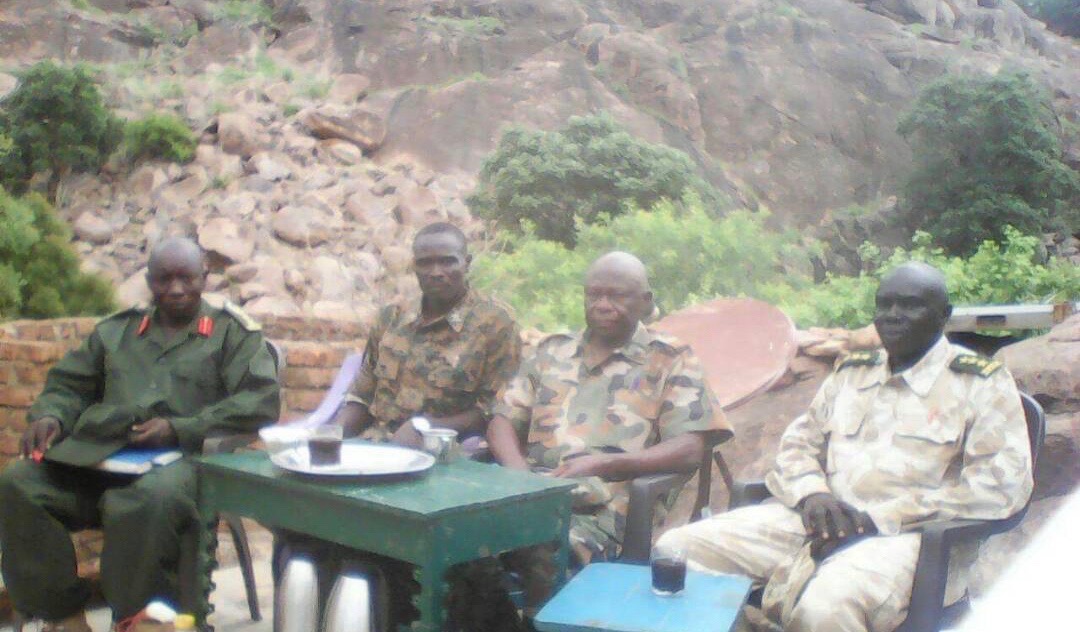SUDAN INSIDER |
This news summary is part of our Sudan Insider, a monthly newsletter providing
news and analysis on Sudan’s biggest stories.
Subscribe here to receive the Sudan Insider in your inbox.
…………………………………………………………………………………………………………..
SPLM-N rift: consensus in Nuba, conflict in Blue Nile
Former deputy chairman of the SPLM-N, Abdelaziz Hilu, arrived on June 29 to the Nuba Mountains, received by Maj. Gen. Jagod Mukwar, SPLM-N Chief of Staff and Brig. Gen. Ezekiel Kuku, among other military leaders and citizens. Hilu announced that he would temporarily take the leadership position until a General Assembly, the body’s highest forum, is held to elect the new leadership.
The two regional rebel political groups, the Nuba Mountains Liberation Council and the Blue Nile Liberation Council, appointed Hilu as SPLM-N Chairman earlier this year, dismissing former SPLM-N Chairman Malik Agar and Secretary-General Yasir Arman.
Disputed Chairman Malik Agar, however, has deemed the takeover illegal, claiming the regional bodies do not have the authority to overthrow his position but must be done through a higher umbrella organisation, the National Liberation Council. Hilu’s supporters, however, claim this higher body has been purposefully dormant and believe the two regional bodies comprise the highest authority for the rebel movement.
Agar has proposed to step down with Hilu and Arman and to appoint a temporary leadership tasked with the preparation for the General Assembly
The SPLM-N movement in the Nuba Mountains has readily accepted Hilu’s leadership and held a meeting July 5 with him to discuss the way forward regarding the peace process, among other issues. The rebel movement in Blue Nile State, however, has experienced at least five separate attacks between supporters of Agar and those of Hilu. The latest attack took place on July 4 outside Doro refugee camp in Maban, South Sudan, along the route to Yabus, the SPLM-N stronghold in Blue Nile.
The rift began in late March after a resignation letter issued by Hilu was leaked to the public. The letter questioned the democratic credibility of Agar and Arman, accusing them of controlling the rebel movement arbitrarily and not representing the movement vis-à-vis the AU-brokered peace talks. The deputy’s letter also accused the SPLM-N leadership of omitting key demands in the peace talks process, including the right to self-determination and to maintain a standing rebel army, instead of integrating into the Sudan Armed Forces.
What it means…
The SPLM-N leadership dispute may fracture the movement regionally, inducing the rebel movement to become a more Nuba-oriented operation. That said, the military support for Agar in Blue Nile State appears to be relatively small and may only be a matter of time before the regional liberation council asserts control.
The split is a welcome development for the ruling National Congress Party who, according to presidential assistant Ibrahim Mahmoud, has called the SPLM-N’s vision for a “New Sudan” as “over for good.” The late SPLM leader Dr John Garang first devised the New Sudan vision, calling for a more inclusive and democratic leadership in Sudan – a concept readily adopted by the SPLM-N movement during the resumption of conflict in 2011.
The conflict in Blue Nile has triggered ethnic tensions. The SPLA-N Head of Army in Blue Nile, Ahmed Almuda, actively recruited individuals from Agar’s tribe, the Angassana, to detain SPLM-N members in Blue Nile who support Hilu’s takeover. The Blue Nile Liberation Council members who deposed Agar accuse the disputed chairman of tribalism, allegedly favouring his tribesmen for political appointments. This charged environment has triggered scattered attacks towards ethnic communities in Blue Nile State and Maban refugee camp, where ethnicity is perceived as shaping political allegiances.
The SPLM-N is under huge international pressure to amend the leadership rift and return to the peace negotiations. The stance of the SPLM-N may be noticeably different under Hilu who believes calling for the right to self-determination should be a central negotiating stance. Agar has criticized this view, claiming it may incite ethnic divisions within the Two Areas and prolong the conflict, according to a statement.





